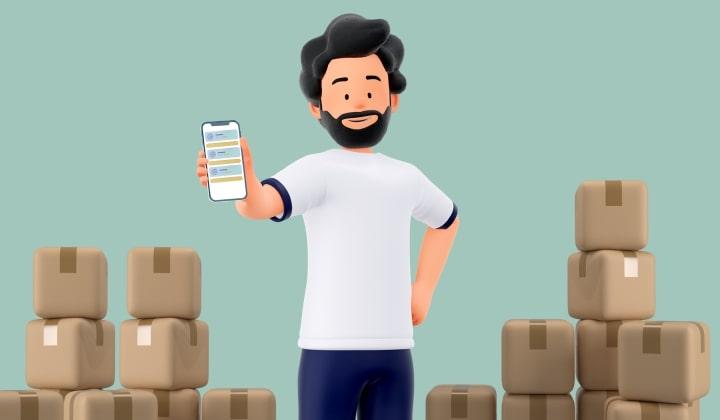For most people, online shopping has long become a habit, and with the COVID-19 pandemic onset, going online has turned out to be the only chance for a business to survive. This has resulted in an increased demand for apps development.
But we know what business owners care about the most: what if the app doesn't pay off? How to beat competitors? How to stand out and not waste budget?
Read the answers to these and other questions in this article with a comment from the SolveIt expert.
Trends in E-Commerce
Even with the easing of coronavirus restrictions, people are not in a hurry to get back offline: making purchases on the Internet is faster and more convenient. Thus, by 2021 the share of sales through mobile applications of all sales on the Internet increased to 53.9% compared to 34.5% in 2017. E-commerce has become more relevant than ever.
Perhaps, there is no particular need to give a dictionary definition of e-commerce, as these words speak from themselves. However, we will clarify: electronic commerce, or e-commerce, is the sale of goods and services via the Internet, that is, any transaction made from a device connected to the network.
Today, our task is to explain how can e-commerce help a business grow and specify the ways e-commerce can improve business.
And a few more important numbers: according to smartinsights.com, about two-thirds of all Internet users make online purchases on their smartphones, and 89% of them use mobile applications for it. In this case, both the client and the business win.
Below we will give several strong arguments in favor of developing a mobile e-commerce application, give you reasons why e-commerce software help, and will try to dispel your doubts on this issue.
What To Start With?
As a business owner, you can perfectly understand all the benefits of your own software solution and still hesitate to go for its development. Or you have already made this decision, but do not know where exactly to start.
The good news: you already know more than you think — at least what the application should not be like.
Change angle
Look at the situation through the eyes of an ordinary user. First off, having become interested in a product or service, you will probably go for online research. And you will find many (or at least a few, depending on the specifics of your request) themed sites and applications.
Like everyone else, you appreciate a user-friendly interface, and you certainly will not return to an application that barely loads content and constantly gives errors.
If it runs like clockwork, has easy payment options, fast order processing, and contains relevant information, then it is highly probable that you will make a purchase there again. Behind the scenes, businesses that deliver this kind of seamless experience often hire Salesforce expert support to ensure their systems—from retail CRM to e-commerce workflows—are optimized, integrated, and reliable.
A Real-World Example: Jabal
Consider the case of Jabal, a global B2B online marketplace for small appliances. The Jabal team approached SolveIt to develop a marketplace web app to digitize and automate their successful offline business. This initiative began with a comprehensive discovery phase, which helped identify the app's logic and the appropriate tech stack. As a result, Jabal launched a fully functioning MVP web app, built on React, with a focus on user experience and future scalability.
Understand the customer
A mobile application is a kind of way to “attach” a customer to your store. Most smartphones have about 30 applications installed, of which about 10 are used daily. Even if your shopping app is not among the latter, the user's habit of seeing its logo on the desktop will inevitably increase their loyalty to the store and stimulate repeat purchases. That’s why it’s essential to understand what makes a good logo — strong branding starts with smart design. One of the key growth drivers for online stores is visibility on search engines as well — something an experienced ecommerce SEO agency can significantly enhance through strategic keyword targeting and technical optimization
Fear of missing out makes users regularly monitor updates on social media and news sites, as well as online stores. Human psychology is something to make use of when it comes to how e-commerce can help business.
Set specific goals
To better understand your goals as a business owner and, accordingly, to make them look more real and feasible, vague “increase sales” and “foster customer loyalty” are not enough.
Analyze the current performance of your business and estimate by how much you want to improve it — yes, with specific numbers. Shopify AI can help you in this case. For example: “Now I have 20 new customers a month, and with the help of the platforms like Shopify and application, I want to reach 100.” Additionally, Shopify developers can assist you in defining specific KPIs to track your progress.plMonitor network activity: Keeping track of user interactions, app performance, and potential security threats is essential. Regularly monitoring network activity allows businesses to detect unusual patterns, optimize server performance, and ensure a seamless shopping experience for users.
Imagine that thanks to an app, these numbers will become reality — and you will no longer want to give up the idea of developing it.
The fact that a business can no longer stay beyond the digital environment is an open secret. Some business owners are still trying to stay offline, looking with envy at competitors who are investing in the development of their mobile applications and e-commerce websites or web apps. However, these businesses often face digital transformation challenges that make adapting to the online landscape crucial for survival.
Of course, we are observing an increase in demand for ecommerce app development, and there are several reasons for this:
• The influx of new buyers. During the self-isolation, the number of buyers in mobile applications increased by 33%, which is 25% more than in 2019. • Distant work. In Russia alone, according to the latest Rosstat data, at the end of the pandemic, about 5.7 million people will continue to work remotely. This means that the frequency of in-app purchases is unlikely to decrease anytime soon. • Self-isolation. Forced isolation has also forced users to go online either way.
The pandemic has contributed to even greater growth in the already steadily developing e-commerce market, which has led to an increase in the number of market players and new offers. Your task is to follow trends wisely. Before developing a product, conduct an in-depth analysis to understand what exactly your consumer needs.
— Polina Kovchuk, Business Development Manager at SolveIt
But you may still have concerns.
What If The Investments Do Not Pay Off?
A custom app is an investment in your business, which is not free. Bear in mind that everything is not limited to development: a ready solution requires follow-up technical support and regular updates.
The payback of the application directly depends on your willingness to constantly invest in improving the buyers’ comfort.
Anyway, the buyer has much more confidence in a store with its own application. For them, the app means that you at least care about the buyer’s impression of your store and are willing to invest — and are investing — in improving the quality of your services.
How To Become More Visible?
And, of course, do not ignore marketing costs in the marketing industry. Spending money on development makes little sense if no one knows about the final product. Any application, even the most flawless one, needs a proper presentation and branding. Tools like Google Slides also help streamline presentations by allowing you to embed video in Google Slides, enhancing team collaboration and communication.
You can contact a fractional marketing agency for promotion, which is likely to cost you a pretty penny, or order both development and marketing services from the same company. The second option is less frequent, however, it has the right to exist. Additionally, consider using an AI paragraph writer to create compelling marketing copy that resonates with your audience. We have some experience in promoting our products: the SolveIt team developed the YMaster application and launched a successful advertising campaign for it. See more in our case.
What Other Benefits Are There?
There are some more points of how e-commerce software can help your business. Additional arguments in favor of developing a mobile e-commerce application are:
• Easy Feedback If a user can share their gratitude, suggestion, or complaint about a product, they will feel their value — because your relationship with a customer does not end with a purchase. • Convenient Business Analysis As a business owner, you need to track app downloads and user engagement to identify the strengths and weaknesses of your storefront. An e-commerce website can improve your business significantly in terms of business processes. • Notifying Users… … about anything. About new products in the catalog, promotions, bonuses, placing an order, filled cart — so that you are always in sight. To further streamline both in‑store and online operations, consider integrating e-commerce and point of sale, like a Magento POS solution. In addition to streamlining processes, you can further increase revenue by leveraging innovative strategies like print-on-demand tools.
Conclusion
Only businesses present on the Internet can compete now. A high-quality mobile application with useful features brings you closer to the client, and you better take advantage of it.
Ordering the development of a mobile e-commerce application, you are investing in the development of your business. If you decide to register an ecommerce business, remember that numbers don't lie: users are eager to make in-app purchases and willingly come back if you could make this experience pleasant for them.
If you are still in doubt, contact us, and we will calculate the cost of your project.



.jpg&w=750&q=75)